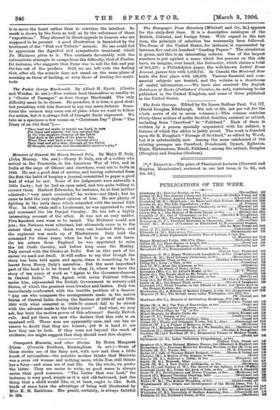Memoirs of General Sir Henry Dermot Daly. By Major H.
Daly. (John Murray. 15s. net.)—Henry D. Daly, son of a soldier who served in the Peninsula, in the American War of 1814, and in India at the siege of Ghazni and elsewhere, went out to India in 1840. He saw a good deal of service, and having cultivated from the first the habit of keeping a journal, committed to paper a good deal of what he saw. Some of his judgments were naturally a little hasty; but he had an open mind, and was quite willing to correct them. Herbert Edwardes, for instance, he at first neither admired—" very much overrated," he writes—nor liked ; but he came to hold the very highest opinion of him. He saw plenty of fighting in the early days, which coincided with the second Sikh War. In 1849, while still a Lieutenant, he was appointed to raise and command the let Punjab Cavalry. He has left a highly interesting account of the affair. It was not an easy matter. Five hundred men were to be raised. The Multanis would not join; the Pathans were reluctant, but ultimately came in to the extent that was wanted ; there were one hundred Sikhs, and the regiment was made up of Hindnstanis. Daly held the command for three years, when he had to go on sick leave. On his return from England he was appointed to raise the 1st Oudh Cavalry, and before long came the Mutiny. Daly served with the Guides at Delhi. But on this part of his career we need not dwell. It will suffice to say that though the story has been told again and again, there is something to be learnt from Henry Daly's narrative. But the most important part of the book is to be found in chap. 11, where we have the story of ten years of work as "Agent to the Governor-General in Central India." The Agent, with seven Political Officers under him, represented the British Government in seventy-odd States, of which the greatest were Gwalior and Indere. Daly was immediately confronted with the terrible problem of a famine. "Any one who compares the arrangements made in the native States of Central India during the famines of 1896-97 and 1899- 1900 with what occurred in 1868-70 cannot fail to be struck with the advance made in the thirty years." And what, we may ask, has been the motive power of this advance P Surely British rule. And yet there are men who declare that this rule is an unmixed evil. These men are apparently sane, and one has no reason to doubt that they are honest; yet it is hard to see how they can be both. If they were not beyond the reach of evidence, one might suggest that they should read this chapter.














































 Previous page
Previous page